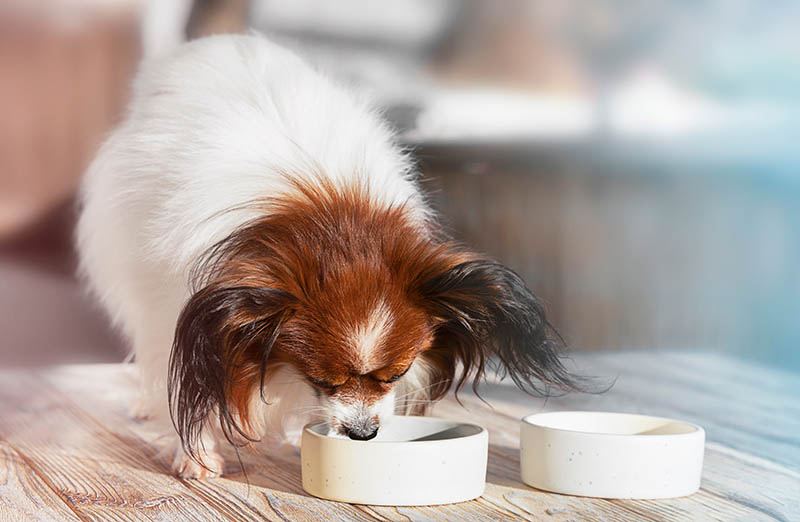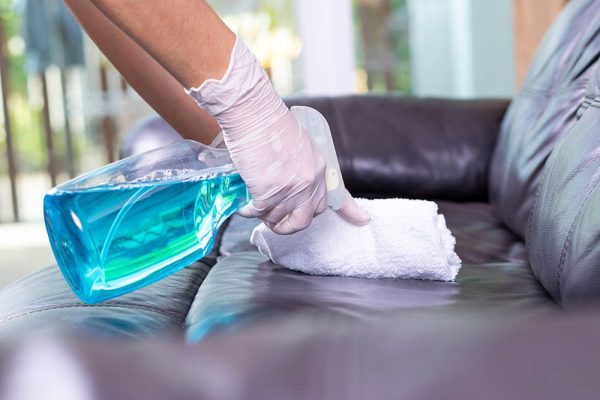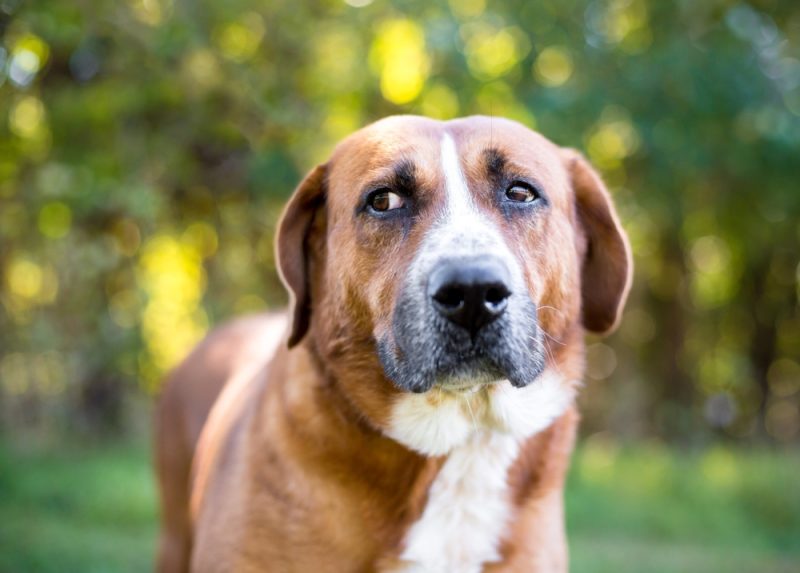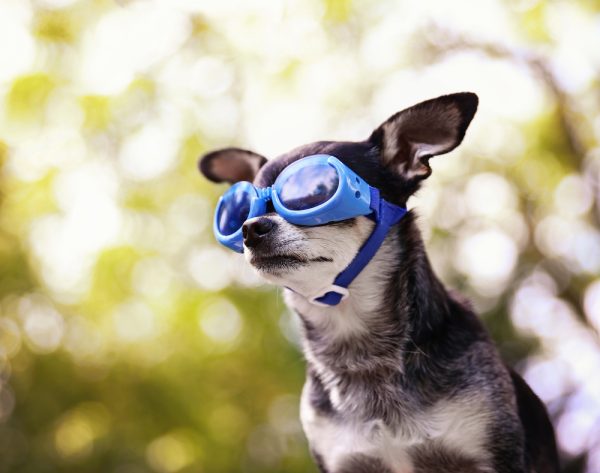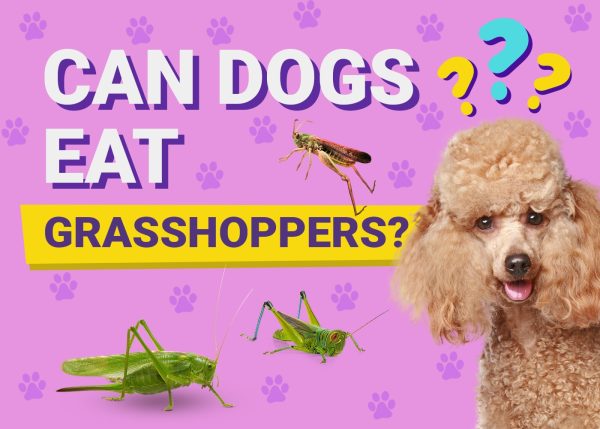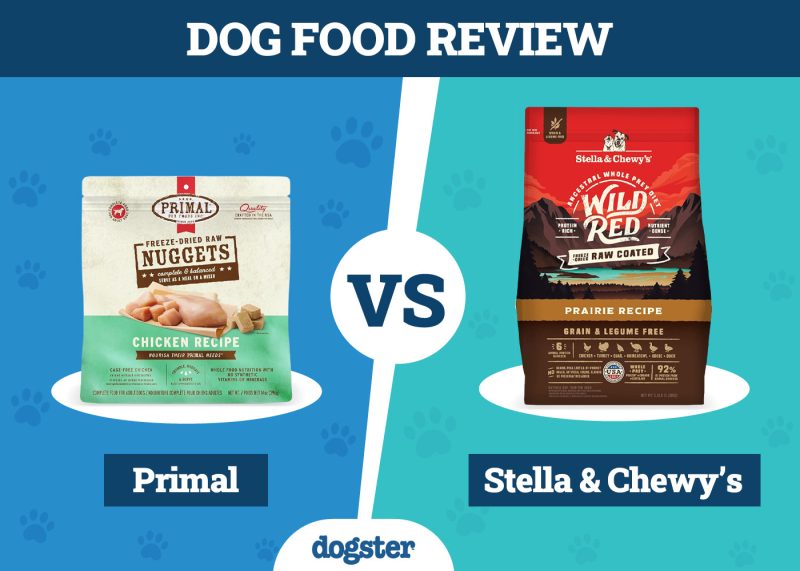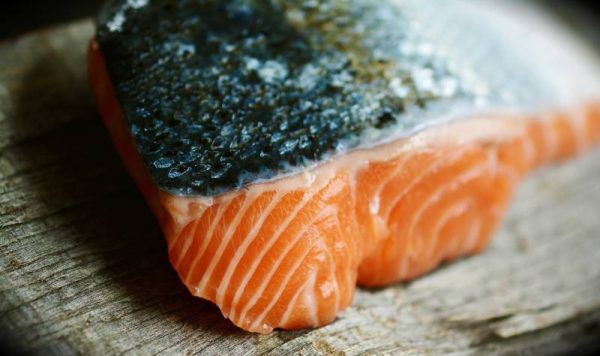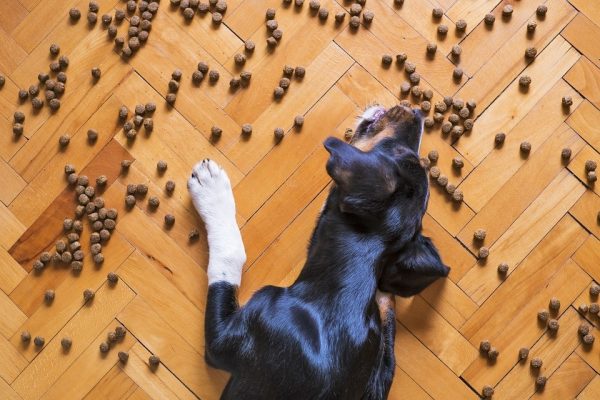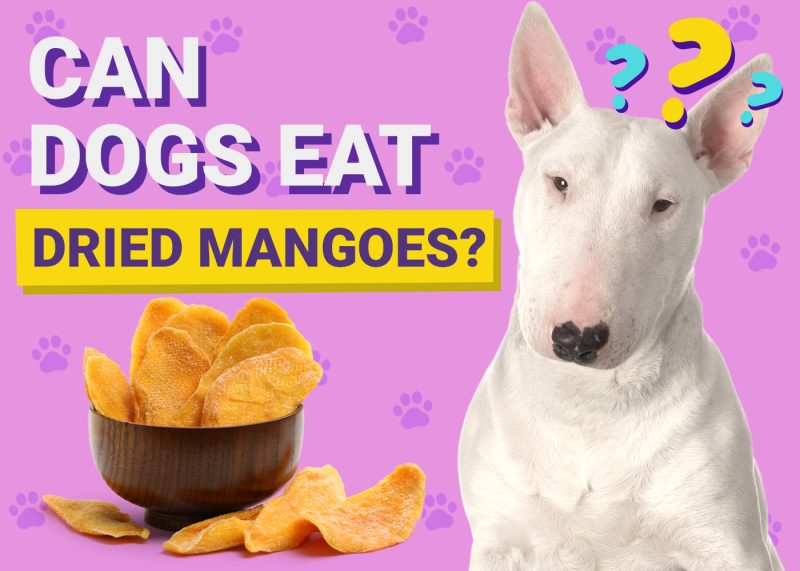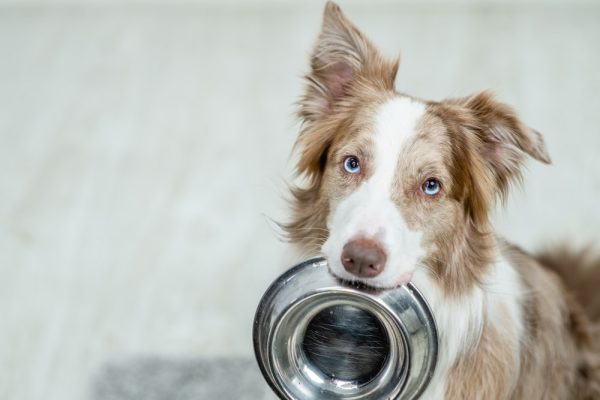In this article
View 2 More +Unlike humans, most animals don’t appear to savor their food by eating it slowly. Some dogs just fill their bellies as fast as possible, whether they’re very hungry or not. Their instinct is stronger than their appreciation for flavors and textures, even if there is no threat of losing their meal to another animal.
In most cases, there is nothing to worry about if your dog doesn’t chew their food; it simply means that you’ve got a guzzler on your hands. However, in some cases, it could lead to digestive problems or be an indication of a medical condition. Thankfully, there are ways to slow your dog’s eating down and improve their digestion.

Why Doesn’t My Dog Chew Their Food?
Although some dogs do chew their food, many don’t. This behavior is instinctual and goes right back to when dogs lived in packs in the wild. Any food that was scavenged would need to be eaten fast before it was eaten by another dog, drew too much attention from other wild animals, or became the reason for a fight to break out. The faster a dog ate their portion of the food and moved on, the safer they were from losing out on a meal or getting hurt.
This behavior could begin early in puppies that were born in large litters, with puppies needing to fight for a nipple on their mother’s body to nurse if there were more puppies than nipples. As the puppies develop and start solids, they may continue to fight for a spot at the bowl with so many little mouths gulping down the food laid down for them.
With this in mind, your dog might be eating without chewing because of their environment. If there is a lot of noise around them, such as machinery, loud music, or screaming children, they may feel as though they are under threat and swallow their food down quickly. If you have several other dogs or pets, they may also try to gulp down their food quickly in fear of those pets getting to their food before they finish it.
A dog is built to eat food quickly as it was a way of survival in their past. If your dog has always been a fast eater and you regularly take them for their veterinary checkups, you probably don’t have anything to worry about.
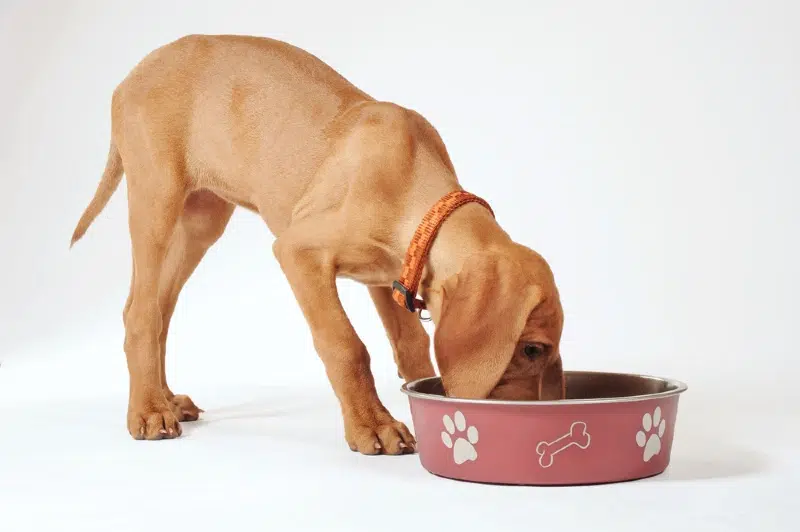
When Should I Be Worried?
If your dog has always chewed their food but they have suddenly stopped, it might be an indication that something is wrong with them. However, not chewing their food will often be one of a few other signs.
1. Dental Disease
Dogs that have suddenly stopped chewing their food, whether soft or hard, and also have bad breath, tartar on their teeth, and other signs of dental disease might have started swallowing their food whole because their mouths are too painful to chew the food.
2. Injury
Another reason could be due to a cut in your dog’s mouth from chewing on something sharp, such as a stone or bone. Tooth fractures are also common from chewing such items. It’s important to take them to the vet for an oral examination to determine what the problem is and to get it treated to reduce the pain or discomfort that your dog is experiencing.
3. Cancer
Cancers in the mouth can also make it difficult for dogs to chew and swallow. This generally occurs in older animals and you might also notice signs of weight loss, vomiting or discomfort around the mouth.
4. Parasites
It’s not uncommon for dogs to get internal parasites, such as roundworms. These parasites live and feed in your dog’s intestines, eating away at the nutrients your dog gets from their food. As this happens, your dog loses out on those necessary nutrients and will gulp down their food in a desperate attempt to fill their stomachs. However, they won’t put on weight even if they are given more food than usual.
5. Poor-Quality Diet
Just as dogs crave more and more food as the parasites steal the nutrients from their bodies, so is the case with diets that don’t have everything your dog needs. A nutrient-deficient diet won’t satisfy your dog and will cause them to always feel hungry, resulting in a dog that gulps down their food instead of chewing it.
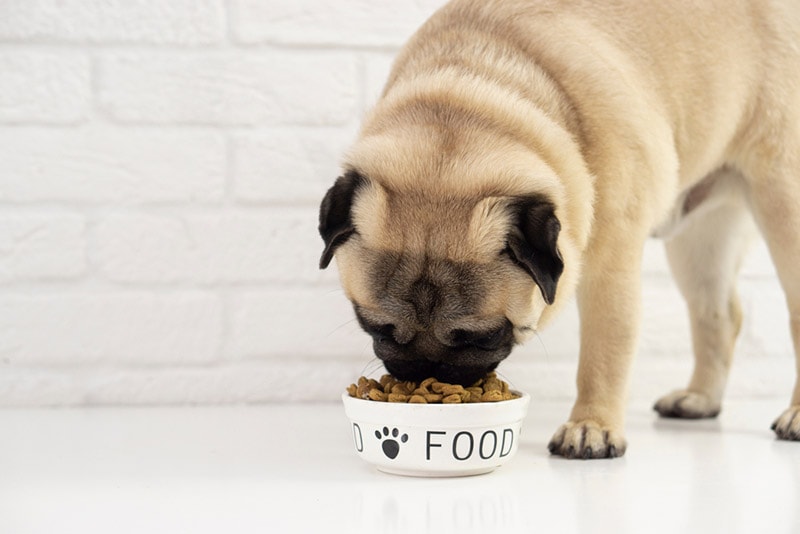

The Problem With Gulping Down Whole Food
Some dogs can gulp down whole food and be fine. However, this way of eating can have a negative impact on some dogs and can cause them to have an upset stomach because the food isn’t able to digest well. This may result in your dog throwing up the food they just gulped down. However, for others, it has the potential to cause bloat, which can lead to gastric dilatation and volvulus, or GDV, a condition where the stomach twists and the dog needs life-saving surgery to survive.
Bloat is more common in larger breeds, and although the cause isn’t known, there is a higher chance of it occurring in dogs that ingest a lot of food and or water very quickly. There are other factors that can also increase the risk in dogs, such as their age, weight, etc.
Bloat occurs when a dog’s stomach stretches because of the large amount of food or gas that they ingested from eating or drinking too quickly. It causes pain in the dog’s stomach. If the stomach twists, it cuts off blood flow, which can cause damage to the stomach wall. Dogs with GDV go into shock because there is not enough blood reaching the heart. It can progress as far as damage to the spleen and other vital organs from being in shock. GDV quickly can be fatal if not recognized and treated.
Along with the abdominal pain, a dog with bloat may also dry heave, pace around the home, guard their stomach, pant, drool, have pale gums, and have a noticeably larger stomach and racing heartbeat. If treated quickly, dogs can recover within a few days.
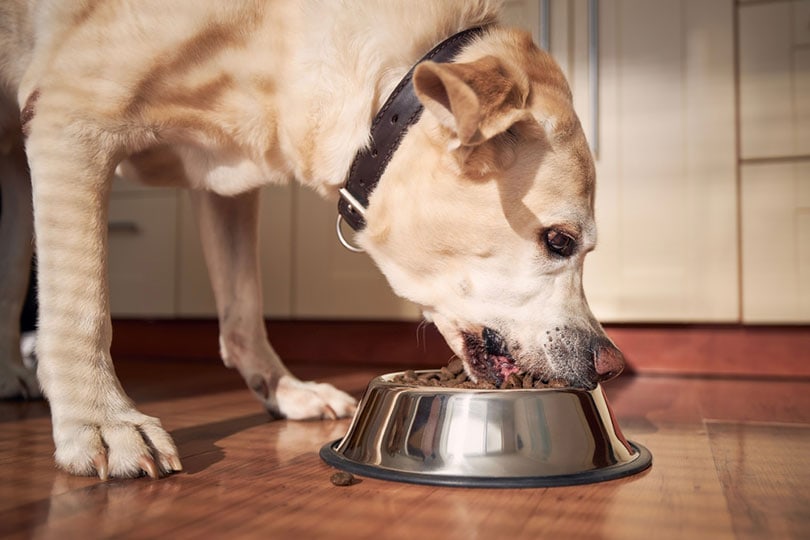
Ways to Encourage Chewing
If your dog looks like they’re always hungry and in a hurry to get all their food down, or they’ve suddenly stopped chewing, the best thing you can do is take them to the vet for a physical and oral examination.
The vet will be able to treat your dog if they have parasites and recommend dog food with quality ingredients that are beneficial to your dog. If there is something preventing your dog from being able to chew their food, your vet will be able to pinpoint the problem and give them the correct care they need to ease their pain and discomfort.
If your dog is naturally a fast eater, be sure not to leave out large amounts of food, as you want to prevent them from overeating. You could also feed them less food more frequently. Also, avoid vigorous exercise right after a meal. These steps will reduce your dog’s risk of developing bloat.
You can slow your dog’s eating down by placing balls and other objects that are too large to swallow in your dog’s bowl so that they have to try to get the kibble under or next to the objects, making it difficult to gobble up all their food in just a few licks. You can also purchase a slow-feeding bowl, snuffle mat, or puzzle feeder that does the same thing. You can also place dog food in a dispensing toy so that as your dog plays with the toy, they can gobble up the kibble that falls out.
Some types of kibble are larger than others so buying a larger size biscuit may force your dog to chew more. Remember when changing your dog’s diet, it is best to do so gradually to prevent an upset stomach.
If your dog is eating their food quickly because they feel stressed out from loud noises or pets that are trying to steal their food, feed them in a separate room that is quieter and closed off to other pets.
If you need to speak with a vet but can't get to one, head over to PangoVet. It's our online service where you can talk to a vet online and get the advice you need for your pet — all at an affordable price!

In Conclusion
Any changes in your dog’s eating habits should be investigated, but if they have been given a clean bill of health by your veterinarian, simply use techniques to slow your dog’s eating, feed smaller amounts more frequently and make sure they feel safe when eating. Eating slower is better for digestion and decreases their chances of developing bloat.
However, if your dog is gulping down food, always looks hungry, is underweight, seems painful around the mouth, has bad breath, or drops food, there may be a medical reason for them not being able to chew.
See also:
- Why Does My Dog Spill Their Food? 7 Vet-Verified Reasons
- What Is Animal Digest in Dog Food? Vet Reviewed Benefits & Drawbacks
Featured Image Credit: Vyshnova, Shutterstock
